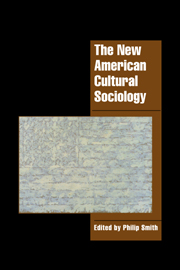PART II - The production and reception of culture
Published online by Cambridge University Press: 18 January 2010
Summary
The essays presented in the first part of this book were primarily concerned with uncovering the meanings and structures of culture. Issues related to the social constraints on the production and reception of culture were given somewhat less attention. This is not to say that they were neglected entirely. The work by Brown suggested that the production of discourses is related to the distribution of power, whilst those of Seidman and Alexander pointed to the critical role of the mass media as a communicative institution. Similarly, Wuthnow dealt with the issue of reception in suggesting that the messages of religious fundamentalists and liberals would be interpreted differently by divergent audiences. Finally, Kane's contribution indicated the need to explore the distribution of cultural practices and beliefs across different social groups. Yet in the main, the research questions driving these scholars focused around how best to conceptualize meaning rather than exploring the circumstances under which it is “manufactured” and “consumed.”
The investigation of the production and reception of culture is an area which has recently generated a good deal of scholarship. In part this is the result of a backlash against the monolithic “dominant ideology” and “value systems” theorizing of radicals and functionalists respectively. It also reflects a substantial body of research in the field of mass communications which showed that messages were always mediated in some way by pre-existing prejudices and beliefs, social networks, and a variety of standard socio-demographic variables. Finally, it can also be considered to eventuate from the tradition of empirically grounded, middle-range organizational and institutional analysis in American sociology.
- Type
- Chapter
- Information
- The New American Cultural Sociology , pp. 89 - 92Publisher: Cambridge University PressPrint publication year: 1998



